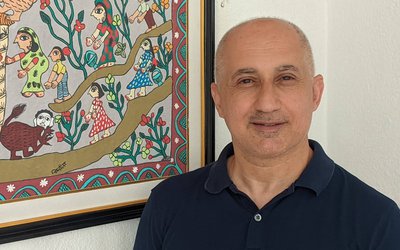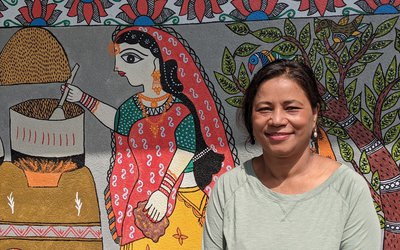Sharu Joshi Shrestha worked for a long time with UNIFEM in empowering women. Joshi in present is the program manager for migration at UN Women. She spoke to MANISH GAUTAM on women’s issues. Excerpts:
Why was the need of UN Women felt when there were UNIFEM and others, already?
Despite many efforts globally, there is still a gap in terms of gender equality. Many evidences, data, research, budget allocations, women’s participation, women’s access to resources and employment, and prevalence of gender-based violence suggest slack progress. Therefore, UN Member States realized that there is a great need of strong gender architecture to assist member states to work with stronger mandates and resources. So, the four UN agencies working on gender equality and women's empowerment were merged to create UN Women, a UN Entity for gender equality and Women’s empowerment. Hence, on 2nd July 2010, UN Women was announced by the UN Secretary General, Mr. Ban Ki Moon, which became operational on 1st January 2011.
What are the key priorities of UN Women?
The five key areas identified are: Violence against women, Women, Peace and security, Leadership and Participation, Economic Empowerment, National planning and budget processes.
Does the creation of UN Women mean for other offices and funds in the UN system working on gender and women’s empowerment to stop doing it?
Absolutely not! UN Women will enhance, not replace, efforts by other parts of the UN system. Other UN agencies will be continuing their work for mainstreaming gender into their programmes. But, UN Women will be in the driving seat and leading others on gender equality and women’s empowerment issues.
Focusing on Economic Empowerment of women, what hindrances do you find in achieving this?
I see one hindrance at the conceptual level. The entire concept of the women’s work has to be revisited. The contributions of women’s work at household are not counted. Most of women’s time is being used for the household chores. But, those activities are not considered as economic activities; hence, their contributions are not visible. As one can see women are fully cooperating for the sustenance of the family, many as "house wives" which I would like it to be termed as “home managers”. Take a glance at all the household chores a woman does where she spends time cooking, cleaning and caring. One simple, maybe a very crude, example, that I want to cite here, is when you go to a restaurant you pay for the service for the cook and waiters, you pay money to the dhobi or dry cleaners. If similar works that a woman does in the public sphere they are monetized and considered economic works. Then why not the women who do the same work in every house are not even considered as economic actors? Women also face glass ceiling in the corporate sector resulting out of time, out from work to give birth and raise children.
Are you saying that I should pay my mother for what she does everyday?
I was expecting the question. I'm afraid it's not what I mean. I think my previous answer has tried to explain what I mean. Rather, I mean to say that women should not be victimized despite their critical contribution just because the system so designed cannot recognize and calculate such contribution. Also defining “productive” and “unproductive” work needs to looked at again. Thanks to Census 2058, this has started counting some of the household work as "extended economic activities". However there are still challenges in valuating these works which needs further debates and methodologies designed.
Please share with us some activities done by UN Women for the economic empowerment of women?
Apart from supporting government to implement Foreign Employment Act and Regulation, we have piloted reintegration programmes for returnee women migrant workers. Through our reintegration programme, 600 returnee women migrant workers and members of their families have found development alternatives, in Nepal. Among them 94% have said that now they want to stay back with children and family. It has reduced risk of forced remigration and trafficking at least to those 600 families. Also we have shown how remittance can be better used for their livelihood. We are also working with Central Bureau of Statistics, and trying to get information on women’s poverty, women’s property and women’s work through Population and Housing Census 2011.
What are the future plans of UN Women?
We are still working on developing our global strategy and country strategy, which will more concretely define our future plans. We expect there will be shift in programme focus from engendering policies to more intensive support to build capacities of our development partners at all levels for effective implementation of policies and programmes, especially targeting the excluded groups of women. We will be supporting the duty bearers to strengthen their accountability while ensuring monitoring and tracking mechanisms to maximize the impact to bring tangible changes in the lives of women and children. Earlier experiences showed that the funds allocated so far, especially at the local level earmarked for women, children and marginalized groups through the decentralized policies for local development has been spent for infrastructure development and rather than on women’s empowerment or related tasks.
- TANAHU HYDROPOWER PROEJCT: A Significant Achievement
- Apr 15, 2024
- AMBASSADOR HANAN GODAR: Sharing Pain With A Nepali Family
- Mar 30, 2024
- VISIT OF KfW AND EIB TO NEPAL : Mission Matters
- Mar 25, 2024
- NEPAL BRITAIN SOCIETY: Pratima Pande's Leadership
- Mar 24, 2024
- NEPAL ARMY DAY: Time To Recall Glory
- Mar 15, 2024
















